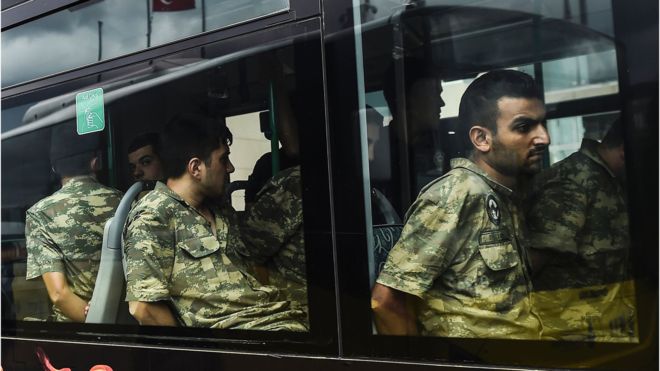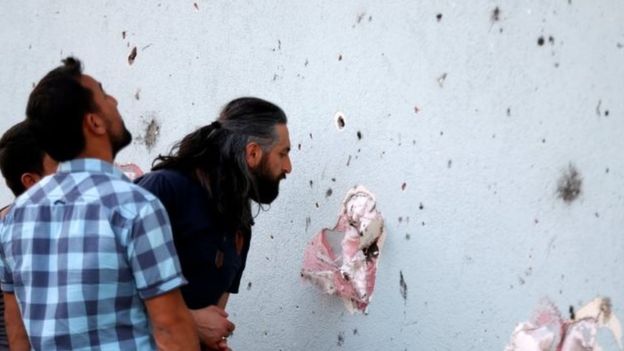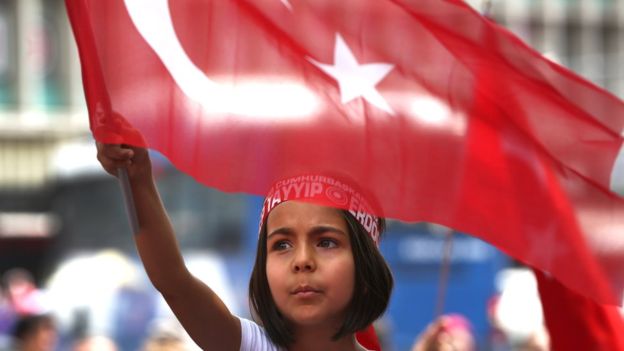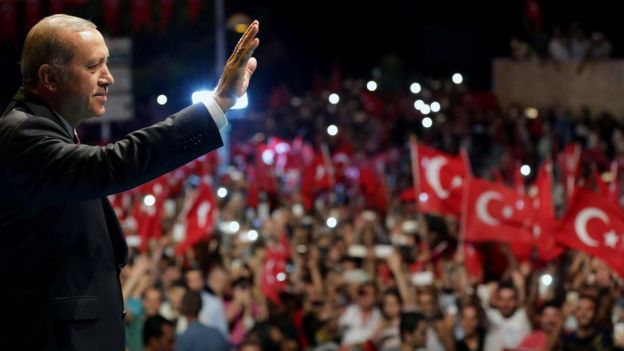Turkey coup attempt: Charges laid against 99 generals and admirals

Turkey has formally charged 99 generals and admirals in connection with the weekend's thwarted coup attempt — a significant chunk of the country's military top brass.
President Erdogan is meeting with loyal commanders and his cabinet in Ankara.
Authorities have banned all academics from travelling abroad, as the purge of state employees suspected of being connected to the failed coup continues.
More than 50,000 people have been rounded up, sacked or suspended.
So far about 1,577 university deans (faculty heads) have been asked to resign in addition to 21,000 teachers and 15,000 education ministry officials.
They are suspected of having links to the alleged mastermind of the coup, US-based cleric Fethullah Gulen — who denies any involvement.
President Recep Tayyip Erdogan is chairing an emergency meeting of the National Security Council and is expected to make further announcements later on Wednesday.
As soon as it became clear that the coup had failed, the purges began — first with the security forces, then spreading to Turkey's entire civilian infrastructure.
Human rights group Amnesty International has warned the purges are being extended to censor media outlets and journalists, including those critical of government policy.
"We are witnessing a crackdown of exceptional proportions in Turkey at the moment.
"While it is understandable, and legitimate, that the government wishes to investigate and punish those responsible for this bloody coup attempt, they must abide by the rule of law and respect freedom of expression," Amnesty's Turkey researcher Andrew Gardner said.
Turkey has now extended the clear-out to the education sector in its desire to root out Gulen supporters.
The Higher Education Council has asked university rectors to "urgently examine the situation of all academic and administrative personnel" linked to what it calls the Fethullah Terrorist Organisation (Feto) and report back by 5 August.
It has also told universities that academics who are already abroad on work or study missions should return home "within the shortest possible time".
A government official told the Reuters news agency that the ban on academics travelling abroad was a temporary measure implemented to stop alleged coup plotters in universities from fleeing abroad.
Turkey is pressing the US to extradite Mr Gulen and the issue was raised during a phone call between US President Barack Obama and President Erdogan on Tuesday, the White House said.
Spokesman Josh Earnest said a decision on whether or not to extradite would be made under a treaty between the two countries.
In a separate development Turkey has barred access to the WikiLeaks website soon after it posted about 300,000 emails sent by President Erdogan's AK Party dating from 2000 to early July 2016.
Wikileaks said that although the documents were obtained before the attempted coup, the date of their publication was brought forward "in response to the government's post-coup purges".
The source of the emails was not linked to the coup plotters or to a rival political party or country, WikiLeaks said.
Turkey's military also announced on Wednesday that it had resumed cross-border strikes against Kurdish rebel targets in northern Iraq, killing about 20 alleged militants. They were the first since the attempted coup.
F-16 jets were reported to have targeted positions of the banned Kurdistan Workers Party (PKK) in Iraq's Hakurk region, Anadolu Agency reported.
The Turkish military has regularly targeted suspected PKK bases in Iraq since last year.
Политика конфиденциальности | Правила пользования сайтом











